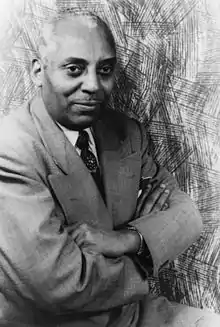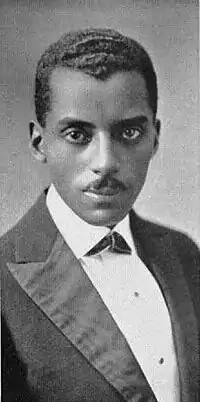Noble Sissle
Noble Lee Sissle (July 10, 1889 – December 17, 1975) was an American jazz composer, lyricist, bandleader, singer, and playwright, best known for the Broadway musical Shuffle Along (1921), and its hit song "I'm Just Wild About Harry".


Early life
Sissle was born in Indianapolis, Indiana on July 10, 1889, around the time his father Rev. George A. Sissle was pastor of the city's Simpson M. E. Chapel.[1] His mother, Martha Angeline (née Scott) Sissle, was a school teacher and juvenile probation officer.[1]
As a youth Sissle sang in church choirs and as a soloist with his high school's glee club in Cleveland, Ohio.[2] Sissle attended De Pauw University in Greencastle, Indiana on scholarship and later transferred to Butler University in Indianapolis before turning to music full-time.[3]
Career

In early 1916 Sissle joined one of the society orchestras organized by James Reese Europe in New York. He persuaded Europe to also hire his friend, pianist and composer Eubie Blake, and later in the year helped Europe organize a regimental band for the 15th Infantry Regiment (Colored) of the New York National Guard. This would later become the New York 369th Infantry "Hell Fighters" Regiment that served nobly in France in World War I, with Europe as a lieutenant and Sissle as his sergeant and lead vocalist.[4] Unlike most military bands it played syncopated music and was credited with introducing jazz to France. Sissle left the army after the war as a second lieutenant with the 370th Infantry Regiment[5] and joined Europe’s civilian version of the 369th band.
Sissle began recording for the Pathe label in early 1917, and sang several vocals on Pathe discs recorded by Europe's 369th Infantry Band in early 1919, after it had become a civilian band.[6]
Not long afterwards, on May 9, 1919, James Europe was murdered by a disgruntled band member in Boston, Massachusetts, leaving Sissle, with the help of his friend, Eubie Blake, to take temporary charge of Europe's band. Years earlier Sissle had struck up a partnership with Blake after they first met in Baltimore in 1915.[7]
Shortly after World War I, Sissle joined forces with Blake to form a vaudeville music duo, "The Dixie Duo". After vaudeville, the pair began work on the jazz musical revue Shuffle Along, which incorporated many songs they had written, and had a book written by F. E. Miller and Aubrey Lyles. When it premiered in 1921, Shuffle Along became the first hit musical on Broadway written by and about African Americans. It was the first all-black show to reach the Broadway stage in over a decade and included a young Josephine Baker among the performers.[8] The musicals also introduced hit songs such as "I'm Just Wild About Harry" and "Love Will Find a Way".[9][10]
Sissle and his band appear in a 1931 British Pathétone Weekly filmed at Ciro's nightclub in London, performing Walter Donaldson's "Little White Lies" and "Happy Feet", written by Jack Yellen and Milton Ager. In 1932, Sissle appeared with Nina Mae McKinney, the Nicholas Brothers, and Eubie Blake in Pie, Pie Blackbird, a Vitaphone short released by Warner Brothers. In February 1931, Sissle accompanied Adelaide Hall on piano at the prestigious Palace Theatre (Broadway) in New York during her 1931-32 world tour.[11]
In 1954, New York radio station WMGM, which was then owned by Loew's Theatre Organization, signed Sissle as a disc jockey. His show featured the music of African-American recording artists.[12] Sissle was a member of Alpha Phi Alpha fraternity.
See also
Bibliography
- Williams, Iain Cameron Underneath a Harlem Moon: The Harlem to Paris Years of Adelaide Hall. Bloomsbury Publishers, ISBN 0-8264-5893-9. Chapter 3: Shuffle-Along Nicely - recounts the Shuffle Along musical.
References
- Notes
- Reef (2010)
- Gates, Henry Louis; Appiah, Kwame Anthony, eds. (1999). Africana: Arts and Letters: An A-to-Z Reference of Writers, Musicians, and Artists of the African American Experience. Basic Civitas Books. ISBN 978-0465000715.
- Badger, Reid (1995). Life in Ragtime: a biography of James Reese Europe. Oxford University Press. ISBN 978-0195060447.
- Badger, A Life in Ragtime, 133, 141.
- National Cemetery Administration. U.S. Veterans Gravesites, ca.1775-2006[database on-line]. Provo, Utah, USA: Ancestry.com Operations Inc, 2006.
- Brooks, Lost Sounds, 365-371.
- Ebony, July 1973
- Bill Kirchner, ed. (2000). The Oxford Companion to Jazz. Oxford University Press. p. 700. ISBN 019512510X.
- Southern, Eileen (2002). Kernfeld, Barry (ed.). "Eubie Blake". The New Grove Dictionary of Jazz (2nd ed.). London, UK: MacMillan. 1: 231.
- Graziano, John (2002). Kernfeld, Barry (ed.). "Noble Sissle". The New Grove Dictionary of Jazz (2nd ed.). London, UK: MacMillan. 3: 596.
- Williams, Iain Cameron (2002). Underneath a Harlem Moon: The Harlem to Paris Years of Adelaide Hall. Continuum. pp. 389, 395. ISBN 0826458939.
1931-Adelaide Hall appears four times at the Palace Theatre (Broadway) during her 1931-32 world tour - February (with Noble Sissle), April, July & November
- "Noble Sissle to D.J. Platter Show". Billboard. Nielsen Business Media, Inc. January 16, 1954. ISSN 0006-2510.
- Bibliography
- Brooks, Tim, Lost Sounds: Blacks and the Birth of the Recording Industry, 1890-1919, 363-395, Urbana: University of Illinois Press, 2004.
- Reef, Catherine (2010). African Americans in the Military. New York City, New York: Facts on File, Inc. ISBN 978-1-4381-3096-5.
- Fuld, James J. (2012). The Book of World Famous Music, Classical, Popular and Folk (5th ed.). Dover Books. ISBN 978-0486414751.
External links
| Wikisource has original text related to this article: |
| Wikimedia Commons has media related to Noble Sissle. |